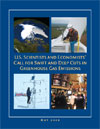 In an open online letter, more than 1,700 of America’s leading scientists and economists call on policymakers to legislate immediate, deep reductions in global warming emissions. The letter comes as the Senate begins to debate the Lieberman-Warner climate bill—which already fails to match the cutbacks advised in the letter. The online statement includes the signatures of six Nobel Prize winners and 31 members of the National Academy of Sciences, and marks the first time leading US scientists and economists have joined to make an appeal to policymakers. “We call on our nation’s leaders to swiftly establish and implement policies to bring about deep reductions in heat-trapping emissions. The strength of the science on climate change compels us to warn the nation about the growing risk of irreversible consequences as global average temperatures continue to increase over pre-industrial levels. As temperatures rise further, the scope and severity of global warming impacts will continue to accelerate.”
In an open online letter, more than 1,700 of America’s leading scientists and economists call on policymakers to legislate immediate, deep reductions in global warming emissions. The letter comes as the Senate begins to debate the Lieberman-Warner climate bill—which already fails to match the cutbacks advised in the letter. The online statement includes the signatures of six Nobel Prize winners and 31 members of the National Academy of Sciences, and marks the first time leading US scientists and economists have joined to make an appeal to policymakers. “We call on our nation’s leaders to swiftly establish and implement policies to bring about deep reductions in heat-trapping emissions. The strength of the science on climate change compels us to warn the nation about the growing risk of irreversible consequences as global average temperatures continue to increase over pre-industrial levels. As temperatures rise further, the scope and severity of global warming impacts will continue to accelerate.”
Nevertheless, the GOP, those Grand Old Peabrains, threaten to filibuster, while Bush, the mastermicromind, promises to veto. Think of this week’s efforts by the Senate as a kind of paid rehearsal for the really big legislative battles that will supposedly consume their senatorial calories sometime in the coming years… As for those concerned that a dress rehearsal and a long debate aren’t swift enough or deep enough, here are a few highlights from the many voices included the letter:
“Investing now in energy efficiency and low-carbon technologies not only will create new business opportunities, but is also likely to be less expensive than a crash program to implement these solutions at a future date, when it will be more difficult to limit climate impacts”—Anthony C. Fisher, University of California Berkeley… “The future of our society depends on effectively managing and reducing greenhouse gas emissions. Public and private research and development support for these efforts will allow us to transition to a carbon-neutral energy system that improves both environmental quality and economic growth”—Gordon Rausser, former chief economist of the US Agency for International Development.
The letter ends almost plaintively: “A strong U.S. commitment to reduce emissions is essential to drive international climate progress. Voluntary initiatives to date have proven insufficient. We urge U.S. policy makers to put our nation onto a path today to reduce emissions on the order of 80 percent below 2000 levels by 2050. The first step on this path should be reductions on the order of 15-20 percent below 2000 levels by 2020, which is achievable and consistent with sound economic policy. There is no time to waste. The most risky thing we can do is nothing.”
Julia Whitty is Mother Jones’ environmental correspondent, lecturer, and 2008 winner of the Kiriyama Prize and the John Burroughs Medal Award.















